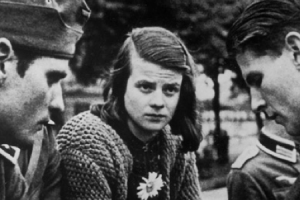Sophie Scholl, shortly before her death.
How can we expect righteousness to prevail when there is hardly anyone willing to give himself up individually to a righteous cause. Such a fine, sunny day, and I have to go, but what does my death matter, if through us, thousands of people are awakened and stirred to action?
Spoken by Sophie Scholl only moments before her death, these words seem to echo through time. Sophie was like so many of us: a girl who led her life at home and school. At the time of her death, Sophie had graduated from university, worked as a kindergarten teacher, and was working at a metallurgical plant in Ulm, Germany. She loved books, music, and sports; she passionately studied philosophy and biology.
Born in May of 1921, Sophie led a life similar to many Western girls. She went to school and helped around the house. Her parents instilled in her a great dislike for injustices and a strong moral conscience, bringing her up a devout Lutheran. They encouraged her passions and education. Her parents even let her join the Hitler Youth movement when Hitler came to power in the 1930s, though her father was firmly against Hitler’s beliefs.
Sophie saw the changes that Germany went through as the Nazi party took control. At first, she saw them as opportunities: joining the Hitler Youth movement and later becoming a squad leader for the German Girls League. Yet some of the changes were not welcome. Her school underwent drastic changes, having all books and lessons replaced with Nazi-approved materials and only employing teachers who belonged to the Nationalist Socialist Teachers League. Sophie remained friends with Jewish girls, and became more skeptical of the movement when Jews were segregated from Germans. As the changes happened, Sophie went to the University of Munich, where she studied philosophy and biology.
Her dislike of the Nazi party intensified when her father was arrested for criticizing Hitler at work. It came to a boil when her boyfriend, Fritz Hartnagel, wrote her from the Eastern Front describing the concentration camps and the shooting of unarmed Soviet prisoners. Sophie saw this as a complete violation of human rights and joined her brother, Hans, as a member of the White Rose movement.
As a member, Sophie distributed pamphlets that advocated against Nazi beliefs. On February 18, 1943, Sophie and Hans were distributing leaflets at Munich University. After their class, they left the remaining pamphlets at the university for students to find. Unfortunately, they were seen by a caretaker, who called the Gestapo (police). Sophie and Hans were arrested, tried, convicted of high treason, and sentenced to death. Only a few hours later, Sophie was beheaded at the age of 22.
Sophie did not do anything to gain worldwide attention. She merely stood up for what she believed in, even in the smallest of ways. She was friends with others despite their differences in belief and distributed leaflets in attempts to educate others about the injustices she saw in Nazi Germany.
Sophie Scholl remains, to this day, one of the most inspirational girls I might ever read about, simply because she took a stand for what she believed was right.
-Tiffany Piotti
Junior Girl
Girl Museum Inc.

